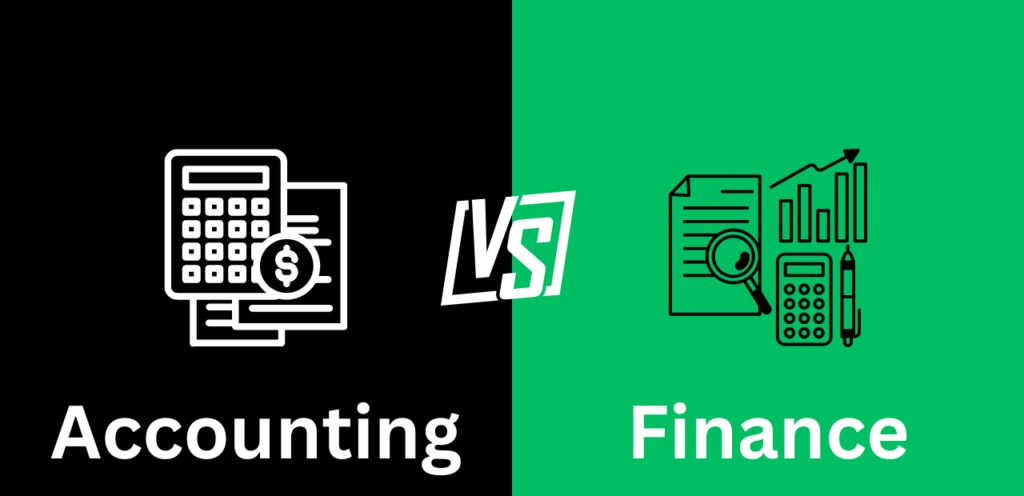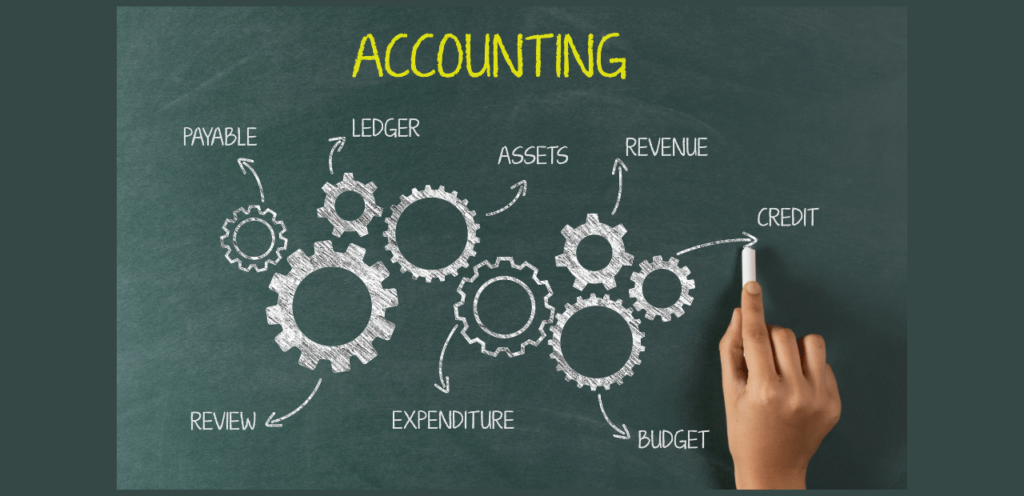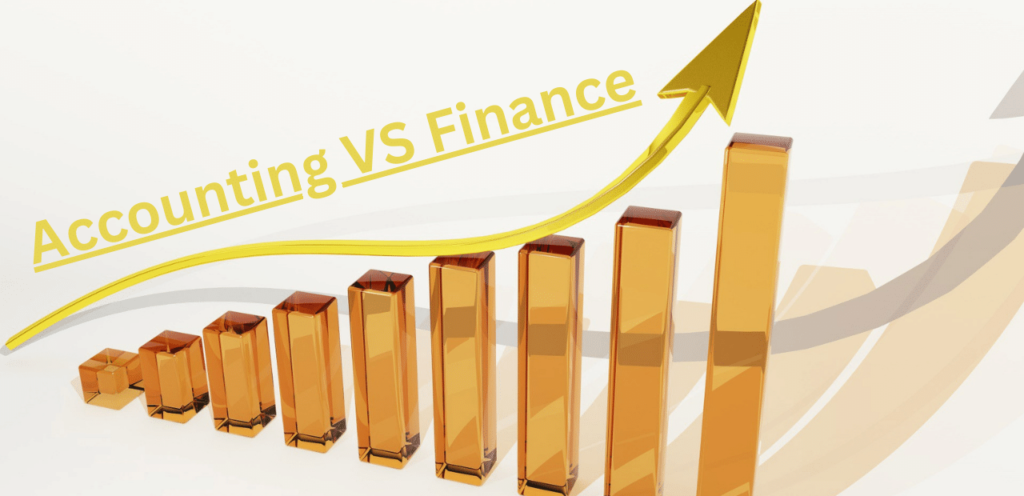

Explore the distinctions between accounting and finance, and make informed decisions.

In the intricate tapestry of personal and business finance, the terms “accounting” and “finance” often become entwined, leaving individuals bewildered about the distinctions. If you’ve ever found yourself pondering the differences between these two financial pillars, you’re not alone. This article aims to unravel the complexity, providing a comprehensive guide to the both fields tailored for the common person. By the end, you’ll not only understand the intricacies but also feel empowered to navigate your financial journey with confidence.

It, in its essence, serves as the meticulous storyteller of your financial affairs. It goes beyond mere number-crunching; it is the art of recording, summarizing, and interpreting the financial transactions that shape your economic narrative. Think of it as the architect behind the scenes, constructing the foundation upon which wise financial decisions are made. To delve deeper, let’s explore the pivotal role of accounting in financial management.
In the vast landscape of financial management, it stands as a foundational pillar. Its primary objective is to provide a systematic and accurate representation of an entity’s financial transactions. It encompasses a range of activities, from recording day-to-day transactions to preparing detailed financial statements.
Financial statements, including the balance sheet, income statement, and cash flow statement, are the tangible outputs of the accounting process. Each statement serves a unique purpose, collectively offering a comprehensive view of an organization’s financial health. The balance sheet presents a snapshot of assets, liabilities, and equity at a specific point in time. The income statement outlines the revenue and expenses over a set period, revealing the profitability of the entity. Meanwhile, the cash flow statement tracks the inflow and outflow of cash, providing insights into liquidity.
Beyond the technicalities, it is governed by a set of principles and standards that ensure consistency and transparency in financial reporting. Generally Accepted Accounting Principles (GAAP) and International Financial Reporting Standards (IFRS) guide accountants in preparing financial statements that accurately reflect the economic reality of an organization.

In the world of finance, accountants are the unsung heroes, diligently working behind the scenes to ensure the financial narrative is not just a sequence of numbers but a coherent and accurate story. Their role extends beyond mathematical precision; it requires a keen eye for detail, a commitment to accuracy, and the ability to interpret the financial language.
Accountants act as financial custodians, ensuring that every transaction is recorded accurately and in compliance with regulatory standards. Their work goes beyond number-crunching; it involves making sense of financial data, identifying trends, and providing valuable insights to support strategic decision-making.
The skill set required for this subject is diverse, encompassing mathematical proficiency, attention to detail, analytical thinking, and a thorough understanding of financial principles. Accountants must stay abreast of evolving regulations and adapt to the changing landscape of financial reporting.
Examples of how accountants contribute to financial stability are abundant. From preparing tax returns to conducting audits, accountants play a crucial role in ensuring that an organization’s financial activities align with legal requirements and ethical standards. In essence, accountants are the architects of financial transparency, laying the groundwork for informed decision-making.

Its realm of is surprisingly diverse, akin to a palette of colors each serving a distinct purpose. Managerial accounting is like the personal financial advisor you consult for making day-to-day money decisions. It involves the preparation of internal reports that help managers make informed decisions about the allocation of resources, cost control, and performance evaluation.
Financial accounting, on the other hand, is the storyteller we mentioned earlier, narrating your financial tale to the world. It focuses on the preparation of external financial statements that provide stakeholders, such as investors and creditors, with a comprehensive view of an organization’s financial performance.
Then there’s forensic accounting, akin to a financial detective, unveiling mysteries hidden within the numbers. Forensic accountants are called upon to investigate financial irregularities, fraud, and legal disputes. They combine skills with investigative techniques to uncover financial discrepancies and provide expert testimony in legal proceedings.
The versatility within the field of accounting is striking. Accountants can specialize in areas such as tax accounting, cost accounting, or internal auditing, each requiring a unique set of skills and expertise. This diversity ensures that accounting professionals can find roles that align with their interests and strengths.
As we shift our focus to finance, it is crucial to understand that finance is not merely about money; it is the strategic commander guiding your financial ship through the vast sea of economic decisions. Finance is the art of managing resources, making informed decisions, and steering towards financial goals. Imagine finance as the compass directing your financial journey, ensuring you navigate the twists and turns with precision.
Finance encompasses a broad spectrum of activities, ranging from investment and risk management to capital budgeting and financial planning. At its core, finance aims to optimize the allocation of resources to achieve the organization’s objectives. It is forward-looking, involving projections, forecasts, and strategic planning to ensure long-term financial sustainability.

To comprehend finance, envision financial markets as bustling shopping malls where pieces of companies are bought and sold. Financial instruments, in this analogy, are the products available in these malls, each carrying its own unique value. Financial management acts as the wise shopping list, guiding you to make optimal choices and ensuring that your financial resources are utilized most efficiently.
Financial markets serve as the platforms where buyers and sellers come together to trade financial instruments. These markets include stock markets, bond markets, and commodity markets, among others. Investors participate in these markets to buy and sell financial assets, with prices determined by the forces of supply and demand.
Financial instruments, on the other hand, represent various types of tradable assets. Stocks, bonds, options, and derivatives are examples of financial instruments, each serving a specific purpose in the financial landscape. These instruments provide individuals and organizations with avenues to invest, hedge risks, and diversify their portfolios.
Financial management, as the wise shopping list, involves making decisions about how to allocate financial resources to achieve organizational goals. This includes decisions about budgeting, capital expenditures, and financing options. The goal is to maximize shareholder value by ensuring that resources are employed in the most efficient and effective manner.
The role of financial instruments in risk management is crucial. Organizations use instruments like insurance, derivatives, and hedging strategies to mitigate the impact of uncertain events on their financial health. By carefully managing risks, organizations can safeguard their financial stability and protect against adverse market conditions.

Finance professionals are the captains of your financial ship, entrusted with steering towards prosperity. Their responsibilities go beyond number analysis; they are the architects of financial strategies, evaluating investments, managing risks, and helping you make strategic decisions that align with your financial objectives.
Finance professionals are integral to the success of organizations and individuals alike. They play a pivotal role in the allocation of resources, ensuring that capital is deployed in ventures that generate the highest returns. Investment bankers, financial analysts, and financial managers are among the various roles within the realm of finance.
The skills required for success in finance are diverse, ranging from analytical thinking and strategic planning to effective communication and risk management. Finance professionals must possess a deep understanding of financial markets, economic trends, and the factors influencing investment decisions.
Exploring real-life scenarios showcases the decision-making role of finance professionals. Imagine a company looking to expand its operations. Finance professionals would assess the financial feasibility of the expansion, considering factors such as market trends, potential returns, and associated risks. They would develop financial models, conduct cost-benefit analyses, and recommend funding options to support the expansion.
In strategic planning and forecasting, finance professionals anticipate future financial trends and formulate plans to achieve organizational objectives. This involves projecting financial statements, evaluating investment opportunities, and aligning financial strategies with the overall goals of the organization.

Now, let’s unravel the subtle yet significant differences between the two. Accounting is akin to looking at your financial photo album, capturing the essence of where your money has been. In contrast, finance peers into the future, sketching out plans and strategies to guide your financial journey ahead. While both are integral, accounting dwells in the past, and finance anticipates the future, creating a dynamic balance essential for financial success.
Accounting, with its historical focus, is concerned with recording, classifying, and interpreting past financial transactions. It provides a detailed account of an organization’s financial performance, offering stakeholders insights into its economic activities. The reports generated by accountants, such as balance sheets and income statements, serve as snapshots of the financial past.
In contrast, finance takes a forward-looking approach, embracing the mantra that the past is prologue. Finance professionals leverage historical data to make informed predictions about future financial trends. Their focus is on strategic planning, forecasting, and allocating resources to achieve long-term financial goals. Finance is the compass that guides organizations through the uncertainties of the future.
Real-world analogies can help readers grasp the disparities between both fields. Consider accounting as the historian meticulously documenting every detail of a journey. The historian’s role is to faithfully record the events, transactions, and experiences along the way. On the other hand, finance is the navigator charting the course for the next leg of the journey. The navigator analyzes the historical path, considers external factors like weather and terrain, and plots the optimal route forward.
Despite their distinct focuses, both are interdependent. The accuracy and reliability of data complied by accountants are paramount for informed financial decision-making. Finance professionals rely on the historical context provided by accountants to formulate strategies, assess risks, and guide organizations toward financial success. In essence, accounting provides the raw material, and finance shapes it into a strategic plan.
Common misconceptions about both of them can further contribute to the confusion. Some may perceive accounting as a mundane task, confined to number-crunching and compliance. In reality, it is a dynamic field that requires analytical thinking, interpretive skills, and a deep understanding of financial principles. On the other hand, finance is not just about managing money; it involves complex decision-making, risk evaluation, and the strategic allocation of resources.

For those considering joining the financial superhero squad, understanding the academic paths is crucial. Aspiring accountants often delve into one of the two fields of studies, honing their skills in the art of recording and interpreting financial transactions. Finance professionals, on the other hand, may explore economics, mathematics, and statistics, acquiring a holistic understanding of the financial landscape. The key is to embark on a path that resonates with individual interests and aspirations.
The academic journey for accountants typically involves coursework in financial accounting, managerial accounting, taxation, and auditing. These courses provide a solid foundation in accounting principles, ethical standards, and regulatory requirements. Aspiring accountants may pursue degrees such as Bachelor of Science in Accounting or Bachelor of Business Administration with a focus on accounting.
Finance professionals often pursue degrees in finance, economics, or related fields. Academic programs in finance cover topics such as financial management, investment analysis, risk management, and financial markets. Degrees such as Bachelor of Science in Finance or Bachelor of Business Administration with a concentration in finance equip individuals with the knowledge and skills needed for success in the field.
The evolving nature of academic programs in accounting and finance reflects the dynamic landscape of the financial industry. Institutions are increasingly incorporating technology and data analytics into their curricula, preparing students for the demands of the digital age. Interdisciplinary knowledge, including an understanding of business operations, ethics, and communication, is increasingly emphasized to produce well-rounded professionals.

The world of careers in both is vast and diverse, offering a multitude of opportunities for those equipped with financial expertise. Accountants may find themselves as auditors, tax professionals, or even forensic investigators, delving into the intricate details of financial records. Finance professionals, on the other hand, could become financial analysts, investment bankers, or the guiding force behind a company’s financial strategy. The impact of these professions extends beyond individual careers, influencing the global and personal financial tapestry.
The role of accountants in various industries is expansive. Auditors, for instance, examine financial statements to ensure compliance with accounting principles and legal regulations. Tax professionals navigate the complex landscape of tax codes, helping individuals and organizations optimize their tax positions. Forensic accountants use their investigative skills to uncover financial irregularities, detect fraud, and provide expert testimony in legal proceedings.
Finance professionals contribute to the financial success of organizations through diverse roles. Financial analysts assess the financial health of companies, analyze market trends, and provide recommendations for investment decisions. Investment bankers facilitate capital raising, mergers and acquisitions, and other financial transactions. Financial managers oversee the financial activities of organizations, ensuring sound financial practices and strategic decision-making.
The impact of these professions on the global and personal financial landscapes cannot be overstated. Accountants contribute to financial transparency, helping stakeholders make informed decisions about investments, loans, and business partnerships. Finance professionals drive economic growth by facilitating capital flows, supporting businesses in expansion efforts, and optimizing financial resources for long-term sustainability.
The choice between both professional careers often hinges on individual preferences, skills, and aspirations. Accountants may find fulfillment in the meticulous analysis of financial records, ensuring accuracy and compliance. Finance professionals, on the other hand, may thrive in the dynamic world of financial markets, strategic planning, and investment analysis. Regardless of the chosen path, both professions play pivotal roles in shaping the financial landscape.

The synergy between the two field is nothing short of magical. Accountants provide the data – the historical context, if you will – and finance professionals transform that data into a strategic plan. It’s akin to a perfect dance where the precision of accounting data meets the strategic finesse of financial planning. Together, they ensure that your financial journey is not only accurately recorded but also wisely navigated toward prosperity.
The collaboration between both of them begins with the meticulous work of accountants. They record every financial transaction, classify expenses, and summarize financial activities. The resulting financial statements serve as a comprehensive record of an organization’s past performance.
Finance professionals take the reins from there, using the historical data provided by accountants to make informed decisions about the future. They analyze financial statements, assess market trends, and evaluate investment opportunities. Finance professionals use financial modeling and forecasting techniques to project future performance and guide strategic planning.
Consider a scenario where a company is contemplating a significant investment in new technology. Accountants would provide the historical data related to the company’s financial health, including past expenses, revenue, and cash flow. Finance professionals would then analyze this data to assess the feasibility of the investment, considering factors such as potential returns, risks, and long-term impact.
The collaboration extends to budgeting and resource allocation. Accountants play a crucial role in preparing budgets based on historical data and expected expenses. Finance professionals use this information to align budgetary allocations with organizational goals, ensuring that resources are directed toward initiatives that maximize value.
In the context of decision-making, accountants and finance professionals work hand in hand. Accountants provide the necessary financial information, and finance professionals use their analytical skills to evaluate options, assess risks, and formulate strategic plans. The result is a harmonious integration of past financial data and future-oriented decision-making.
The symbiotic relationship is evident in strategic financial management. Accountants contribute by providing accurate and timely financial information, enabling finance professionals to make informed decisions. Finance professionals, in turn, leverage this information to develop financial strategies, allocate resources efficiently, and guide organizations toward financial success.
The interdependence between both of them is not confined to large corporations. It extends to individuals managing personal finances. Accountants help individuals track income and expenses, prepare tax returns, and maintain financial records. Finance professionals assist in making strategic decisions about investments, savings, and retirement planning. Together, they ensure that personal financial journeys are not only well-documented but also strategically navigated.
The collaboration between the two fields is not without its challenges. Differences in perspectives, communication barriers, and evolving regulatory landscapes can pose obstacles. However, the commitment to a common goal – effective financial management – fosters a collaborative spirit. Organizations that recognize and nurture this synergy unlock the full potential of both disciplines, creating a powerful force driving financial success.

As we embrace the digital era, technology has woven its threads into the fabric of both fields, ushering in unprecedented advancements. Automation, artificial intelligence, and blockchain technologies have revolutionized traditional accounting tasks, enhancing accuracy and efficiency. In the realm of finance, advanced analytics and modeling tools empower professionals to make real-time, data-driven decisions. Adaptability to these technological changes becomes paramount, akin to mastering a new tool in the ever-evolving toolkit of financial professionals.
In accounting, the impact of technology is transformative. Automation of routine tasks, such as data entry and reconciliation, allows accountants to focus on higher-order activities that require human judgment and interpretation. Artificial intelligence algorithms can analyze vast datasets, identify patterns, and even predict potential financial risks. Blockchain technology ensures the integrity and security of financial transactions, reducing the risk of fraud and errors.
Finance professionals benefit from technology in diverse ways. Advanced analytics tools enable real-time analysis of market trends, helping professionals make timely and informed decisions. Algorithmic trading platforms use complex algorithms to execute trades at optimal times, maximizing returns. The use of big data allows finance professionals to gather insights from massive datasets, enhancing the accuracy of financial projections.
The integration of technology into both field is not without challenges. Professionals need to adapt to new tools and platforms continually. Cybersecurity becomes a critical consideration as financial data becomes increasingly digital. The ethical use of technology, particularly in areas like algorithmic decision-making, demands careful scrutiny.
However, the overall impact is undeniable – technology has streamlined processes, increased efficiency, and expanded the capabilities of accounting and finance professionals. The adaptability to these technological changes has become a valuable skill in the toolkit of financial experts, ensuring they remain at the forefront of industry trends.

In the face of challenges, professionals from both field stand resilient, armed with solutions and strategies. For accountants, keeping pace with ever-evolving regulations presents a perpetual challenge, yet staying informed and adaptable serves as a powerful solution. Finance professionals navigate risks and uncertainties, akin to steering a ship through unpredictable waters, but their strategic prowess and analytical skills act as a compass, guiding them to safe harbors. The dynamic nature of the financial landscape ensures that challenges are not roadblocks but rather stepping stones towards greater financial acumen.
For accountants, the challenge of regulatory compliance is ever-present. As financial regulations evolve in response to changing economic landscapes, accountants must stay abreast of updates and ensure that their practices align with the latest standards. This requires continuous learning, professional development, and a proactive approach to adapting to regulatory changes.
The digital transformation poses both opportunities and challenges for accountants. While automation streamlines routine tasks, it necessitates upskilling in areas like data analytics, technology proficiency, and cybersecurity awareness. Embracing these changes positions accountants not only as record-keepers but as strategic advisors leveraging technology for enhanced financial management.
Finance professionals encounter challenges in navigating the complexities of financial markets. Market volatility, geopolitical events, and economic uncertainties create a dynamic landscape that demands agility and foresight. Successful finance professionals are those who can analyze these challenges, assess risks, and formulate strategies that mitigate potential downsides.
Risk management is a cornerstone of financial decision-making. Finance professionals continually assess and manage risks associated with investments, market fluctuations, and economic trends. They employ sophisticated risk models, scenario analyses, and stress testing to anticipate potential challenges and devise strategies to protect financial interests.
The digitalization of financial processes introduces cybersecurity challenges. Finance professionals must safeguard sensitive financial information from cyber threats, ensuring the integrity and confidentiality of data. This requires robust cybersecurity measures, employee training, and a proactive approach to identifying and addressing potential vulnerabilities.
The adaptability of both accounting and finance professionals becomes paramount in overcoming these challenges. Continuous learning, professional development, and staying abreast of industry trends are essential practices. The ability to embrace change, whether in regulatory environments or technological landscapes, positions professionals for success in navigating the complexities of the financial world.

Peering into the crystal ball of financial trends reveals a landscape shaped by innovation and evolution. Sustainable investing emerges as a trend aligning finances with ethical values, much like choosing eco-friendly products for a sustainable lifestyle. Fintech innovations, resembling the latest apps simplifying everyday tasks, reshape the financial landscape, making transactions and management more accessible. The influence of global events on remote work trends affects not only how we earn but also how we spend, reflecting the continuous evolution of personal financial practices.
Sustainable investing, once a niche concept, has gained significant traction in recent years. Investors are increasingly considering environmental, social, and governance (ESG) factors in their investment decisions. Sustainable funds, green bonds, and impact investing are becoming mainstream, reflecting a growing awareness of the interconnectedness between financial choices and broader societal and environmental impacts.
Fintech, or financial technology, is transforming the way we manage money. From mobile banking apps to robo-advisors, fintech innovations are making financial transactions more convenient and accessible. Cryptocurrencies and blockchain technology introduce decentralized forms of currency and secure, transparent transaction systems. The rise of neobanks challenges traditional banking models, offering digital-only, user-friendly banking experiences.
The influence of global events on personal finance is evident in the shift towards remote work. The traditional 9-to-5 office model is evolving, with more individuals embracing flexible work arrangements. This not only impacts how we earn but also how we spend. Remote work trends contribute to changes in housing preferences, spending patterns, and the adoption of digital payment methods.
The continuous evolution of personal financial practices requires individuals to stay informed about emerging trends. Whether it’s adopting sustainable investment strategies, embracing digital financial tools, or adapting to changing work patterns, staying ahead of the curve is essential for navigating the dynamic landscape of personal finance.

In the tapestry of both field, what may seem complex at first is, in reality, a roadmap to making your financial journey more straightforward. Accounting paints an accurate picture of where your money has been, while finance charts the course for where it’s headed. Understanding these basics transforms your financial maze into a well-guided adventure, empowering you to make informed decisions and navigate the complexities of your financial journey with confidence.
The key is recognizing the symbiotic relationship between both of them. They are not isolated silos but interconnected disciplines that, when harmonized, create a robust framework for financial success. Accountants lay the foundation with accurate data, and finance professionals sculpt that data into a strategic plan.
As you navigate the ever-evolving landscape of personal and business finances, remember that challenges are not roadblocks but opportunities for growth. Embrace the technological advancements reshaping the financial industry, stay informed about emerging trends, and, most importantly, leverage the collaboration between accounting and finance to your advantage.
Your financial journey is unique, and understanding the nuances of both subject matters equips you with the tools to tailor strategies that align with your goals. The complexities of financial management become more manageable when viewed through the lens of informed decision-making, strategic planning, and the collaboration of two essential disciplines.
So, as you embark on your financial adventure, let the synergy of both be your guiding light. With accurate historical data and forward-looking strategies, your financial journey becomes not just a series of transactions but a purposeful navigation towards prosperity. Money, once perceived as complex and elusive, becomes a tool at your disposal, and your financial story transforms into a narrative of informed choices and strategic achievements.

No, accounting goes beyond that; it is about creating a detailed financial diary, recording where your money has been and where it's going.
Accountants are akin to financial storytellers. They ensure every dollar is accurately placed, contributing to the coherence and accuracy of your financial narrative.
Certainly! Financial accounting is comparable to creating a report card for your money, summarizing your financial story for the world to see.
Finance professionals act as financial captains, steering your financial ship. They analyze investments, manage risks, and help you make strategic decisions aligned with your financial goals.
Think of accounting as providing the data (historical context), and finance as turning that data into a strategic plan. Together, they ensure your financial journey is accurately recorded and wisely navigated toward prosperity.

Explore the dynamic world of Accounting and Finance with insights from a seasoned professional. As an ACCA and MS Accounting & Finance graduate, I bring expertise to FinanceAccounting.us, offering valuable perspectives and practical tips for navigating the intricate realms of financial management and accounting

Explore the intricate realms of finance and accounting with me, and let’s embark on a journey to enhance your financial prowess. Whether you seek strategic financial guidance or comprehensive accounting knowledge, I am here to empower you
All Rights Reserved © 2024 FinanceAccounting.US | Privacy Policy
5 Responses
Dear Good and knowledgeable. Keep it up
Thanks a lot for appreciation
Thank you for creating such valuable content. Your hard work and dedication are appreciated by so many.
Thanks for appreciation
Thanks a lot for appreciation